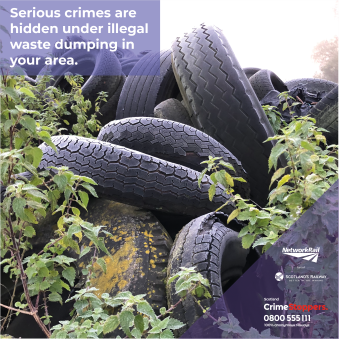Tell us who is illegally dumping waste in Scotland
Crimestoppers has launched a new campaign in partnership with Network Rail Scotland to highlight the impact criminal gangs are causing by dumping large-scale waste in communities.

Waste crime takes many different forms, including:
- Large scale dumping of waste (such as a tipper truck dumping over 20 tonnes of waste).
- Illegal waste sites.
- Misdescription of waste, to avoid fees and landfill taxes.
- Illegal export of waste.
- Serious and intentional waste permit breaches.
- Illegal burning of waste.
It’s usually carried out by gangs and individuals who operate bogus waste services, accepting payment for disposal without having the necessary permits for transportation or storage.
Their ’waste disposal business’ can be used as a cover for other serious illegal activities, such as money laundering and modern-day slavery.
Criminals attack rural environments in a variety of ways, from significant scale illegal dumping to heritage crime. It has a detrimental impact on surrounding wildlife, livestock and communities.
Some examples of waste dumping in Scotland include:
- Large scale hazardous waste posing risks to staff and the public was dumped adjacent to Glasgow’s Queen Street Railway line, causing disruption and costing thousands to clear up.
- Household items such as fridges, washing machines, baths and toilets, as well as doors, windows, furniture, building rubble and bin bags, were strewn across ground beneath the M8 in the Blochairn area of Glasgow
- In Port Glasgow, Renfrewshire, a derelict farm was filled with an estimated 10,000 tyres. One barn at the site in Devol that is overflowing with tyres lies within a few metres of a housing estate. Tyres are classified as hazardous waste because of the polluting emissions they give off and their potential to catch fire.
If you suspect an individual or company is committing a waste crime, you can tell us what you know and stay 100% anonymous - guaranteed. Call free, any time of the day or night, on 0800 555 111 or fill in our quick and easy online form, right here on our website:
Find out more about serious organised waste crime
“For this campaign with Network Rail Scotland, we spoke to communities affected by large scale waste dumping. Many people said looking at waste piles of rubbish made them feel unsafe and impacted their mental health. They were also unaware of the serious crimes waste crime dumping covers up.
“Scotland is classed as 97% rural, with rural communities in particular relying on it for business, farming and tourism. Waste dumping covers hidden crimes and has hidden consequences for communities, including negative effects on property values, increased crime rates and mental health issues in areas where waste dumping is prevalent.
“Often the criminals behind it are hard to identify as they typically pose as legitimate businesses. Illegally dumping waste is a lucrative business for criminal organisations, and warehouses or derelict sites are a prime target to mask this activity. Serious and organised waste crime is on the rise, and often on an industrial scale.
“We want communities and the waste industry to speak up 100% anonymously to our charity if they know or suspect who is dumping large scale waste in Scotland.”
Angela Parker, Crimestoppers' Scotland National Manager
"Fly-tipping is always an eyesore and a hazard, but it's especially concerning when it happens near a railway.
"Dumped rubbish can fuel lineside fires, act as climbing aids for those trying to breach secure boundaries and often attract children and youths to play in dangerous areas - putting themselves, passengers, and rail staff at serious risk.
"That’s why we’re working closely with partners to prevent fly-tipping and catch those responsible. By tackling this issue together, we’re helping to protect our communities and ensure the railway remains safe and reliable for everyone."
Neil Cook, Route Crime Manager for Network Rail Scotland